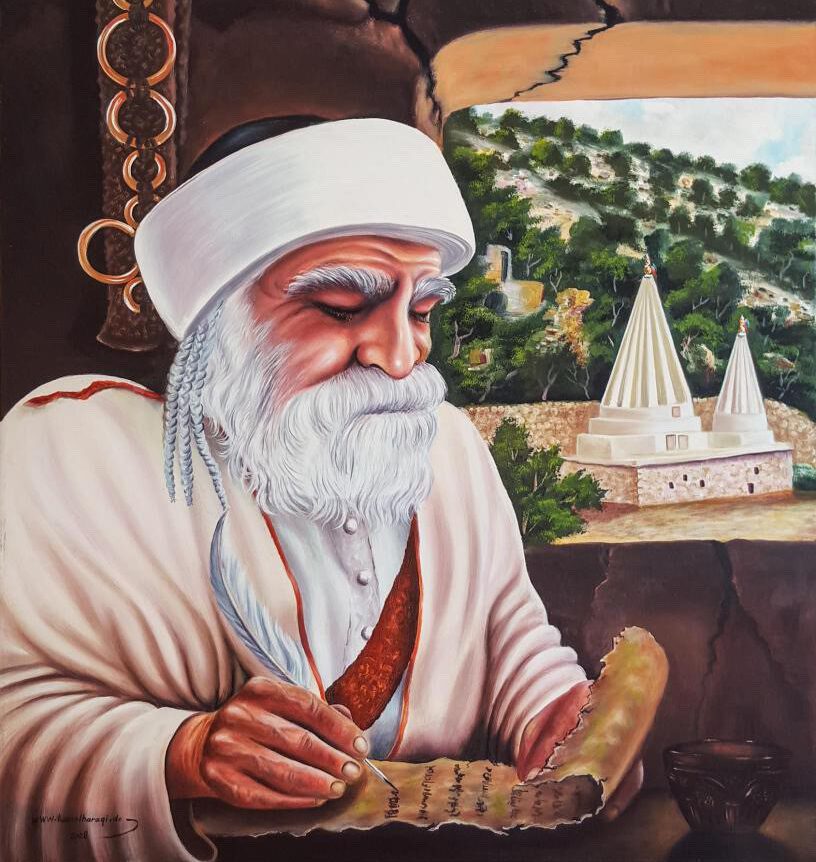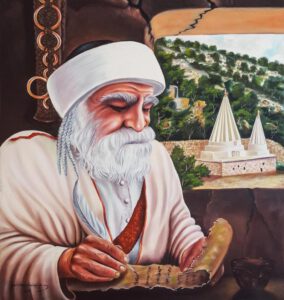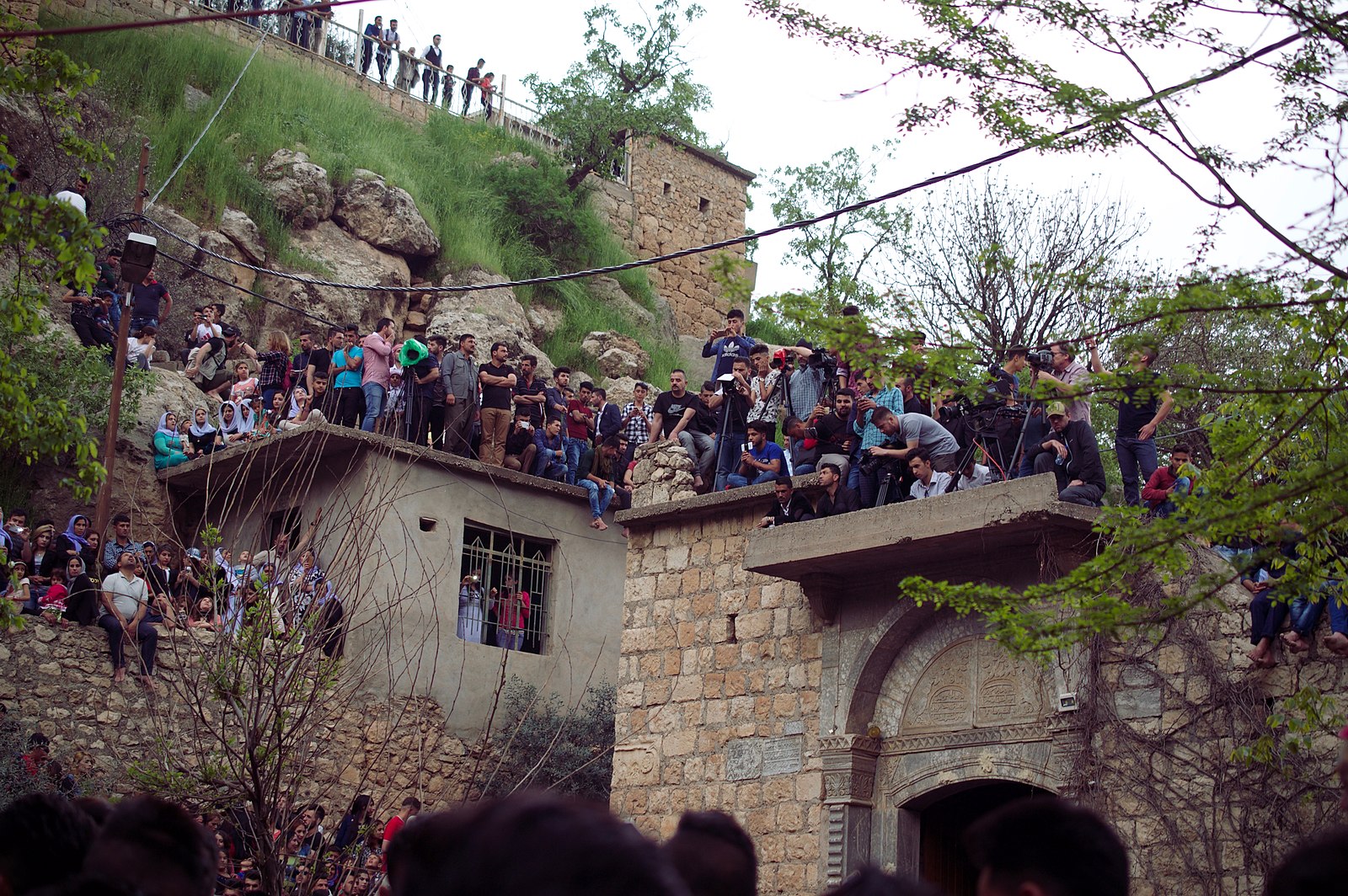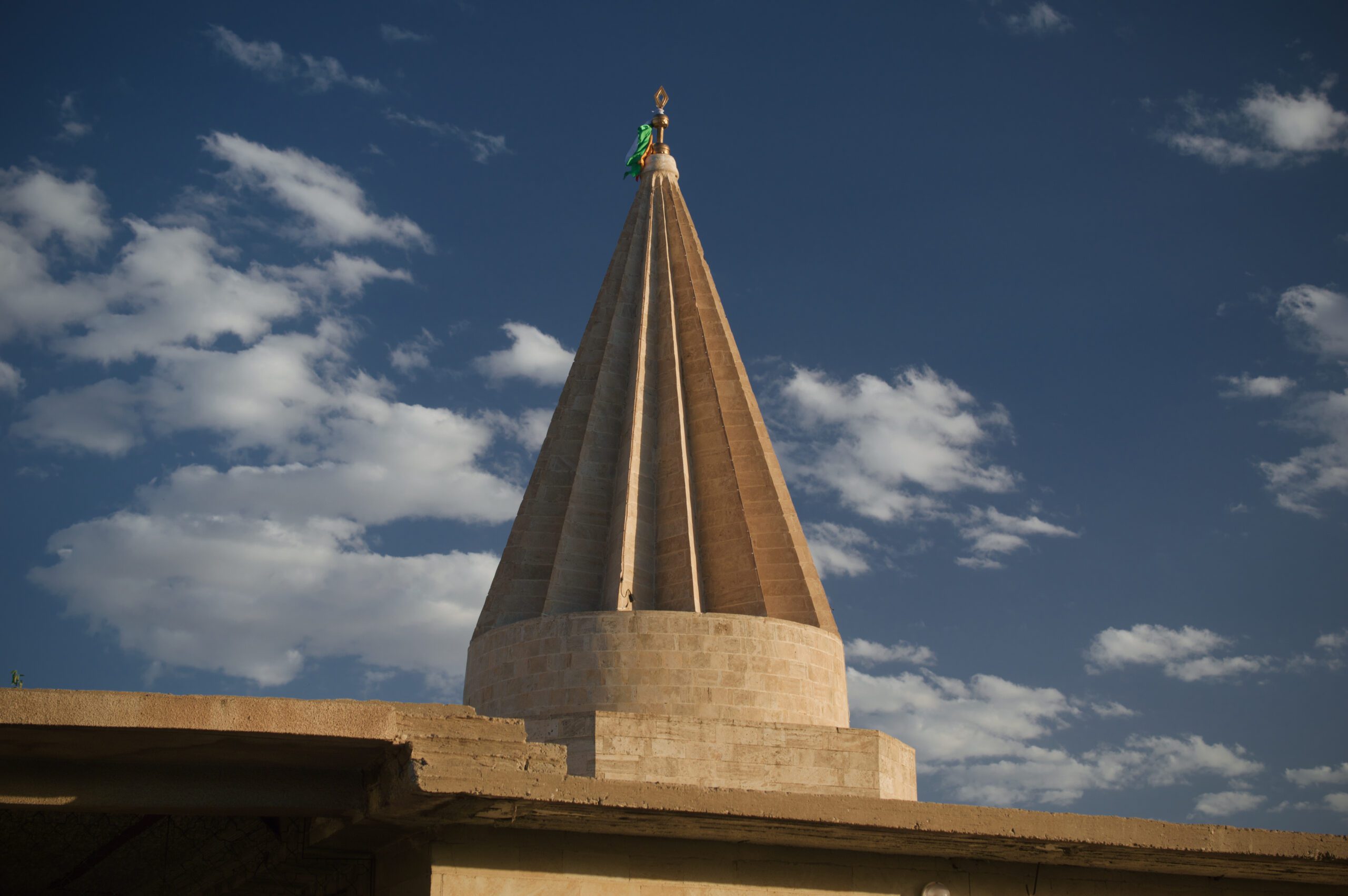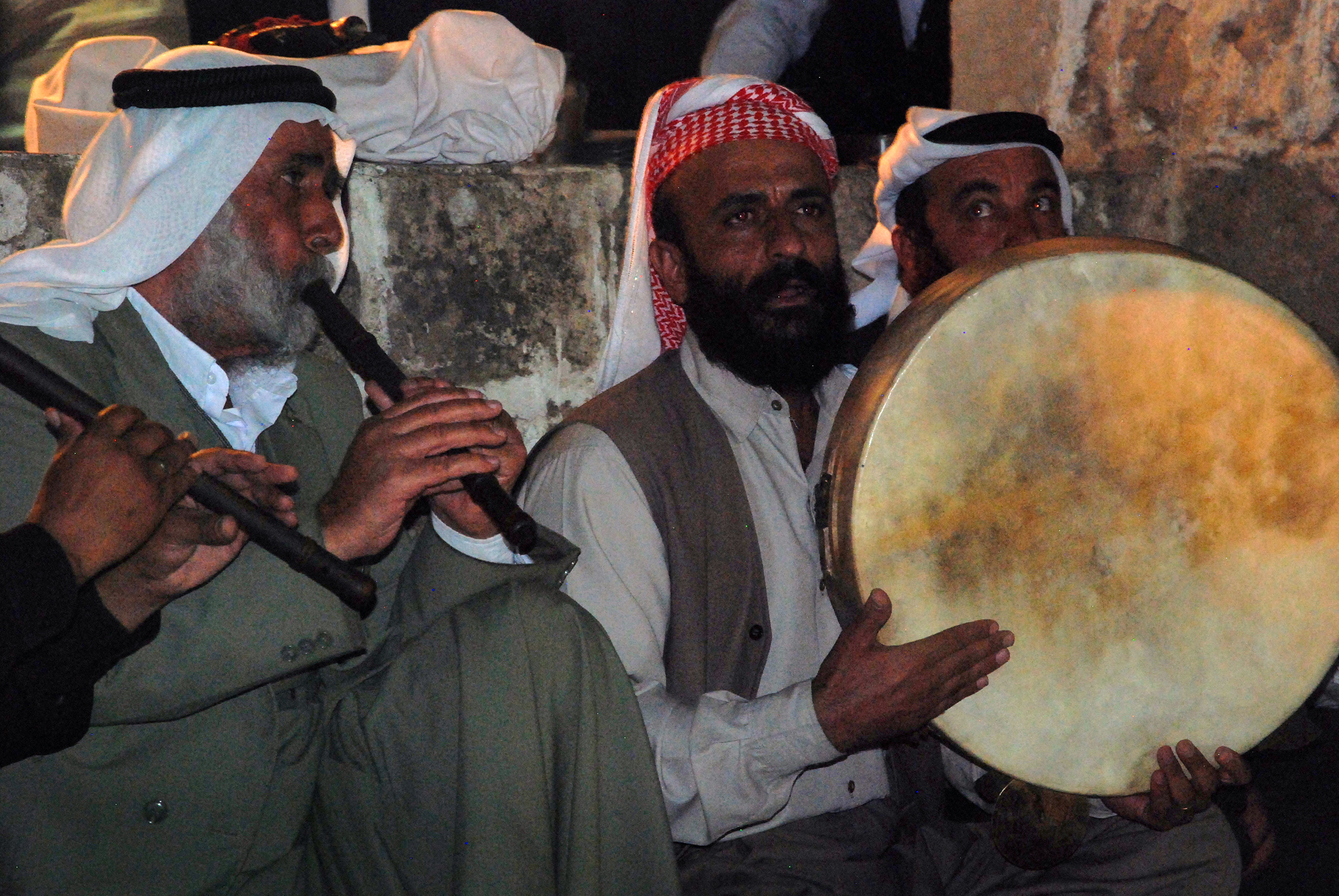Qewlê Pîr Dawid
Qewlê Pîr Dawid (Hymn of Pîr Dawid) is a hymn which contains a hagiographic account of Pîr Dawid, also known as Pîr Dawidê Xerbende. Xerbend (lit. clothed in rags) customarily refers to a Derwêş or a (faithful) servant, thus his name can roughly be translated as “Pîr Dawid the Dervish.” Pîr Dawid was one of the closest disciples of Şîxadî as well as one of his forty companions. He is not to be confused with Pîr Dawidê bin Derman, another separate Ezidi saint. Currently, no lineages of Ezidi Pîrs bear the eponym of Pîr Dawidê Xerbende, however, some Pîr clans do trace their lineage to him. Pîrs of Pîr Xanî lineage trace their ancestry back to a certain Pîr Merwan who in turn, together with Hesin Pîrik, Hesen Telk and Pîr Derbês, was descended from Pîr Şerefê Mêravî the son of Pîr Dawidê Xerbende.
The Qewl revolves around a Zengid Sultan[1]Referring to Imad ad-Din Zangi (1084–1146), a contemporary of Şîxadî (Sheikh Adi ibn Musafir) and one of the most powerful rulers of his time, the founder of the Turkic Zengid dynasty. In 1127, … Continue reading who, concerned about the growing influence of Şîxadî, wages war against him. Camping near Lalish, where Şîxadî resides, the Sultan sends his subject, Pîr Dawid, to go and poison him. However, upon meeting Şîxadî, Dawid witnesses his holiness and confesses to Şîxadî the purpose of his visit. Şîxadî transforms the poison given by the Sultan to Dawid into honey and oil. Upon returning to the Sultan, Dawid, filled with wonder about what he witnessed, compares Şîxadî’s power to that of God. For this, the Zengid Sultan then orders his tongue to be cut. Speechless for three days, Dawid resorts to communicating through gestures and then seeks Şîxadî’s help, who restores his tongue and speech. Dawid then asks Şîxadî to endow him with additional strength so that he can showcase his power to the Sultan. In response, Şîxadî sends Dawid back along with another of his disciples, Dod, with a proposal to the Sultan, if he can satiate the undersized Dod, Sheikh Adi will admit defeat and surrender Lalish; otherwise, the Sultan must retreat. Dod then eats through the Sultan’s army’s annual supply of food. Pîr Dawidê Xerbende, having witnessed Şîxadî’s power and miracles, became his devoted disciple, wore the sacred garment “Xerqe” and preached his teachings.
The details provided above, along with this Qewl variant and its interpretation, is sourced from Dimitri Pirbari’s publication of this Qewl in Russian. Another variant was also published and translated to English by Philip Kreyenbroek and Khalil Jindy Rashow in 2005, however, as their work contains many errors and mistranslations, in contrast to Dimitri Pirbari’s translation which was approved by the clergy of the Spiritual Georgian Ezidi Council, we’ve chosen to publish his version. The below text was transliterated into the Latin Kurmancî Hawar alphabet and translated into English by the current author of this article.
Text
“Bi destûrî Xudê,”
(With God’s permission,)
Stanza 1
1. Qedrê mêra yî çende,
How great is the reverence for the [holy] men?
2. Bê gulayî, bê gazinda,
It is flawless and impeccable.
3. Da bideyn medhê Dawidê Xerbende.
Let us praise Dawidê Xerbende.
Stanza 2
1. Qedrê Mêra yî weye,
Such is the reverence for [holy] men,
2. Bê gulayî, bê gazindeye,
It is flawless and impeccable.
3. Da bideyn medhê Dawidê Xerbende.
Let us praise Dawidê Xerbende.
Stanza 3
1. Bifikirine li vî rengî,
Think about it this way,
2. Şêx Mûsa û Siltanê Zengî,
Şêx Mûsa and the Zengid Sultan,
3. We dê çine ba Şîxadî bi cengî,
They are going to war with Şîxadî.
Stanza 4
1. Siltanê Zeng mêrekî bi kar e,
The Zengid Sultan is a well-armed man,
2. Ber diçin dihol û niqar e,[2]i.e naqareh drums
Drums and kettle-drums go ahead of him.
3. Barek kirbûye bar e,
He loaded a load,
4. Aliyek sêk e, aliyek jehr e,
On one side is vinegar, on the other poison,
5. Dawid kire qasid, ba Şîxadî va dihinare.
He made Dawid a messenger and dispatched him to Şîxadî.
Stanza 5
1. Dawid wê diçiye,
Dawid went [to Şîxadî],
2. Şîxadî jê pirsîye:
Şîxadî asked him:
3. “Dawido, tu bi Xudê key, Îlahiye,
“Oh Dawid, by God, in God’s name,
4. tu dê bêjiye min rastiyê,
You will tell me the truth,
5. Diyariya Siltanê Zeng bo min hinartî çiye?”
What gift has the Zengid Sultan sent to me?”
Stanza 6
1. Dawid deng diket bi zar e:
Dawid opened his mouth and spoke:
2. “Ezîzê min, çû nîne ji pêş te ve neyi diyar e,
“Oh my dear, there is nothing that is unknown before you,
3. Diyariya Siltanê Zeng bo te hinartî, aliyek sêk e, aliyek jehr e.”
4. The gift sent to you by the Zengid Sultan is on one side vinegar, on the other poison.”
Stanza 7
1. “Dawido, weye, we nîne,
[Şîxadî spoke:] “O Dawid, it is so and not so,
2. Tu barê xwe dayîne,
Put down your load,
3. Aliyek rûn e, aliyek hingivîn e.”
On one side there is fat, on the other there is honey.”
Stanza 8
1. Şîxadî bi xo Padîşaye.
Şîxadî is himself the King.
2. Dawidî barê xwe danaye,
Dawid put his load down,
3. Şîxadî darsed keramet nimaye,
Indeed, Şîxadî performed a miracle,
4. Dawid ser destê Şîxadî şehde daye.
And Dawid testified [himself] at Şîxadî’s hand.
Stanza 9
1. Dawid vegeriya,
Dawid returned [to the Zengid Sultan],
2. Siltanê Zeng jê pirsîye:
The Zengid Sultan asked him:
3. “Dawido, tu bi Xudê key, Îlahiye,
“O Dawid, by God, in God’s name,
4. Da bêjiye min rastiye,
You will me the truth,
5. Ka huner û kerametêt wî şêxî çiye?”
What are the powers and miracles of that Sheikh?
Stanza 10
1. Dawid wê we dibêye:
Dawid spoke:
2. “Mîro, vegera, were ser rêye,
O [my] lord, go back, take the [right] path,
3. Hunera Şîxadî bê şik ji hunera Xudê ye.”
Şîxadî’s power is undoubtedly from the power of God.”
Stanza 11
1. Siltanê Zeng yêka ne çê kir,
The Zengid Sultan committed an improper act,
2. Ecêbî kubar li nefsê kir,
The pride of his nefs[3]nefs (‘base soul’), the source of egoism. In Yazidism it is contrasted with ruh (‘divine soul’). is remarkable,
3. Girt û ji binda zimanê Pîr Dawid jêkir.
He grabbed Pir Dawid by the tongue and cut it off at the root.
Stanza 12
1. Pîr Dawid pîrekî bi erkan e,
Pîr Dawid is a devoted Pîr,
2. Sê roj û sê şevane,
[For] three days and three nights,
3. Nav leşkerê Siltan Zeng geriya bê zarî bê zimane,
He roamed amidst the Zengid Sultan’s army without tongue and speech,
4. Ziman nebû, bi desta didat xeberdane.
He had no tongue and communicated through gestures.
Stanza 13
1. Pîr Dawid pîrekî mêrsere,
Pîr Dawid is prominent Pîr among [holy] men,
2. Sê roj û sê şeva derandere,
For three days and three nights he wandered,
3. Nav leşkerê Siltanê Zeng geriya seransere,
He roamed among the Zengid Sultan’s army,
4. Ziman nebû, bi desta wê didat xebere.
He had no tongue and communicated through gestures.
Stanza 14
1. Pîr Dawid vedigeriye,
Pîr Dawid returned [to Şîxadî]
2. Şîxadî pif kire devîye
Şîxadî blew into his mouth,
3. Heft cara zimanê Dawid ji berê çêtir digerîye.
Dawid’s tongue moved seven times better than before.
Stanza 15
1. “Dawido, hilu here,
[Şîxadî spoke:] O Dawid, go make your way now,
2. Heke xêr e, heke şer e,
Whether in peace or in war,
3. Hîmeta min bi te re ra.”
You have my protection.”
Stanza 16
1. Dawid dibêjit: “Hey Padişê mino yî bêrî,
Oh my King, Creator,
2. Heke tu kerameteke zimanî meztir min ra ne hinêrî,
if you do not endow me with a miraculous power greater than the tongue,
3. Siltanê Zeng û malxoyê xwe bi çû renga na sipêrî.”
In no way will the Zengid Sultan and his steward surrender.”
Stanza 17
1. Şîxadî bi keramete,
Şîxadî is a miracle-worker,
2. “Dawido, min bi te ra şerte, min bi te eynete,
[Şîxadî spoke:] “O Dawid, I have a covenant with you, my hope is with you.
3. Here leşkerê Siltanê Zeng bo me bike berbate.”
Go crush the army of the Zengid Sultan for our sake.”
Stanza 18
1. Şîxadî Dod[4]”Dod, name of another saint which echoes Dawid, and thus has mistakenly been identified as Dawid. However, it’s worth noting that one of the companions of Sheikh Adi is mentioned as Dod … Continue reading dixwaste,
Şîxadî summoned Dod,
2. Behra Nazokê di bin çengî va dibeste,
[He] attached the Sea of Nazok under his shoulder,[5]I.e under the armpit, according to the narrative of the Qewals, Şîxadî attached a bag under Dod’s shoulder, which is the Sea of Nazok, an invisible mystical sea where the Sultan’s food … Continue reading
3. Li nav leşkerê Siltanê Zeng va kiribû qeste.
[And] dispatched [him] to the [camp of] the Zengid Sultan’s army.
Stanza 19
1. Dodê Şidênî,[6]Dodê Şidên, or Dodē Şidêd, i.e. “mighty Dod” or “Dod the Mighty” from Arab. word “شدید” (‘mighty, strong’). The grammatically correct form … Continue reading
Dod the Mighty,
2. “Hero sibeyke pişt kuçkê Şîxadî pişta xwe vadibênî,
“Every morning, invoke the hearth of Şîxadî,[7]I.e invoke Şîxadî, and he will be your protector. Kreyenbroek inaccurately translates this line in a literal sense and writes that Dod rubbed his back against Şîxadî’s hearth every … Continue reading
3. Siwar be li borê kulbênî,
ride on the voracious[8]Kreyenbroek mistakenly interprets the word “kulbênî” (lit. voracious, insatiable) in his translation as the proper name of a horse. Moreover, the word is spelled incorrectly as … Continue reading horse,[9]Usually in Ezidi Qewls, the horse is a metaphor and signifies ‘nefs’, the ‘animal instinct,’ (in this case ‘insatiability’) which Şîxadî awakens in Dod.
4. Here leşkerê Siltanê Zeng bo me bişkênî.”
Go crush the army of the Zengid Sultan for our sake.”
Stanza 20
1. Şîxadî Dod dihinare,
Şîxadî dispatched Dod,
2. Borê kulbê kiribû siware,
Mounted [him] on the voracious horse,
3. Li nav leşkerê Siltanê Zeng va dihinare,
He dispatched him to [the camp of] the Zengid Sultan’s army,
4. Çend zad û êmîşê wan dixware,
[Dod] devoured all of their food and fruit,
5. Siltanê Zeng û malxoyê xwe mabûn şermîn û şermezare.
The Zengid Sultan and his steward were left disgraced.
Stanza 21
1. Siltanê Zeng ji malxoyê xwe pirsîye,
The Zengid Sultan asked his steward,
2. “Tu bi Xudê key, Îlahiye,
“By God, in God’s name,
3. Dê bêji min rastîye,
You will tell me the truth,
4. Ka zikê Dodî çiye?!”
What kind of belly does Dod have?!”
Stanza 22
1. Malxo deng diket bi zare:
The steward opened his mouth and spoke:
2. “Mîro, zikê Dodî behr e,
“O [my] lord, Dod’s belly is a sea,
3. Dinya û alemê pê nîne çare,
The whole world cannot contend with him,
4. Ji xêrî Melikê Cebare.”[10]Melikê Cebar (lit ‘Mighty King’), sometimes translated as ‘mighty angel.’ The words ‘angel’ and ‘king’ both originate from the Arabic root ملك … Continue reading
Except for the Mighty King.”
Stanza 23
1. Malxo deng diket ji nahîna:
The Steward spoke quietly:
2. “Mîro, zimanê Dodî hilîne,
“O [my] lord, raise Dod’s tongue,
3. Binde behreke şîn e,
[And] under it is a blue sea,
4. Dinya û alemê çar pê nîn e,
The whole world cannot contend with him,
5. Ji xêrî Qutbê zamîne.”
Except for the Axis of Times.”[11]Qutbê zamîn (‘the axis of times,’ or ‘the pole of times’) is highest rank in the hierarchy of saints in Ezidism as well as in Sufism. In Ezidi Qewls, this epithet is … Continue reading
Stanza 24
1. Şîxadî Xudanê Qirarê,
Şîxadî is the Master of Decrees
2. Mêr cema kirin li mixarê,
He gathered men in a cave,
3. Pîr Dawid xelat kiribû wê carê.
And then he bestowed gifts upon Pîr Dawid.
Stanza 25
1. Pîr Dawid pîrekî bi erkan e,
Pîr Dawid is a devoted Pîr,
2. Li gel çil pîra kire pîrê kerman[12]from the word “kerem” (‘grace, miracle’). In this context, it is referring to miracles, however, Kreyenbroek provides various translations which are evidently incorrect. In … Continue reading e,
Together with forty Pîrs, [Şîxadî] made him a Pîr [bestowed] with miracles,
3. Şikir, ya ma suniya[13]Another name for Ezidis in Qewls, referring to them as “Sunetxan”, “Sunetî” or “Sunî”, i.e people of the Sunet, which literally translates to … Continue reading sediq[14]”Sediq” (lit. ‘sincerity’) refers to sincerity in faith. û heya[15]”Heya” (lit. ‘shame’) in Ezidi Qewls refers to morality. It signifies the moral aspect, meaning a person refrains from indecent actions out of shame before God. û îmana.[16]”Îman” (lit. ‘faith’), in Ezidism refers to unwavering faith in God.”
Thanks [to God], sincerity, morality and faith are a part of our principles as people of the Tradition.
“Em kêmîn û Şîxadî temam e.”
(We are imperfect and Şîxadî is perfect.)
References[+]
| ↑1 | Referring to Imad ad-Din Zangi (1084–1146), a contemporary of Şîxadî (Sheikh Adi ibn Musafir) and one of the most powerful rulers of his time, the founder of the Turkic Zengid dynasty. In 1127, the Seljuk Sultan Mahmud II appointed emir (atabek) of Mosul, after which he significantly expanded his control in the surrounding regions. |
|---|---|
| ↑2 | i.e naqareh drums |
| ↑3 | nefs (‘base soul’), the source of egoism. In Yazidism it is contrasted with ruh (‘divine soul’). |
| ↑4 | ”Dod, name of another saint which echoes Dawid, and thus has mistakenly been identified as Dawid. However, it’s worth noting that one of the companions of Sheikh Adi is mentioned as Dod Harûnan in the Mişûr of Pîr Sinî Daranî, one of the 13th century Ezidi manuscripts. This may be very well referring to the same person. |
| ↑5 | I.e under the armpit, according to the narrative of the Qewals, Şîxadî attached a bag under Dod’s shoulder, which is the Sea of Nazok, an invisible mystical sea where the Sultan’s food supply that is to be eaten by Dod will go. |
| ↑6 | Dodê Şidên, or Dodē Şidêd, i.e. “mighty Dod” or “Dod the Mighty” from Arab. word “شدید” (‘mighty, strong’). The grammatically correct form would be Şidêdî, but due to end-rhyme feature of the Qewls, Şidênî is used in this context. |
| ↑7 | I.e invoke Şîxadî, and he will be your protector. Kreyenbroek inaccurately translates this line in a literal sense and writes that Dod rubbed his back against Şîxadî’s hearth every morning (Kreyenbroek, Rashow 2005: 129).” |
| ↑8 | Kreyenbroek mistakenly interprets the word “kulbênî” (lit. voracious, insatiable) in his translation as the proper name of a horse. Moreover, the word is spelled incorrectly as “kulêdî” (Kreyenbroek, Rashow 2005: 129).” |
| ↑9 | Usually in Ezidi Qewls, the horse is a metaphor and signifies ‘nefs’, the ‘animal instinct,’ (in this case ‘insatiability’) which Şîxadî awakens in Dod. |
| ↑10 | Melikê Cebar (lit ‘Mighty King’), sometimes translated as ‘mighty angel.’ The words ‘angel’ and ‘king’ both originate from the Arabic root ملك (malak). The word “Cebar” (‘jabār’ or ‘جبار’) is one of the epithets of God, meaning ‘Mighty King.' |
| ↑11 | Qutbê zamîn (‘the axis of times,’ or ‘the pole of times’) is highest rank in the hierarchy of saints in Ezidism as well as in Sufism. In Ezidi Qewls, this epithet is primarily attributed to Şîxadî, as well as several other saints. |
| ↑12 | from the word “kerem” (‘grace, miracle’). In this context, it is referring to miracles, however, Kreyenbroek provides various translations which are evidently incorrect. In 1995, he translates this word as “Pîr of Kirman,” in a footnote suggesting that it might be Kermanshah (Kreyenbroek 1995: 115, 287–288), and in 2011 — as “caravan” (Kreyenbroek, Rashow 2005: 130). |
| ↑13 | Another name for Ezidis in Qewls, referring to them as “Sunetxan”, “Sunetî” or “Sunî”, i.e people of the Sunet, which literally translates to “Tradition” and refers to the Ezidi beliefs, teachings and laws. Not to be confused with the Islamic Sunnah, which is the same word with same root but in Islamic context instead refers to traditions of practices of Prophet Muhammed which constitute a model for Muslims to follow. |
| ↑14 | ”Sediq” (lit. ‘sincerity’) refers to sincerity in faith. |
| ↑15 | ”Heya” (lit. ‘shame’) in Ezidi Qewls refers to morality. It signifies the moral aspect, meaning a person refrains from indecent actions out of shame before God. |
| ↑16 | ”Îman” (lit. ‘faith’), in Ezidism refers to unwavering faith in God.” |
